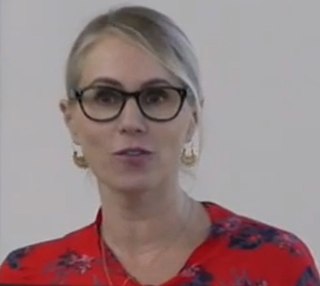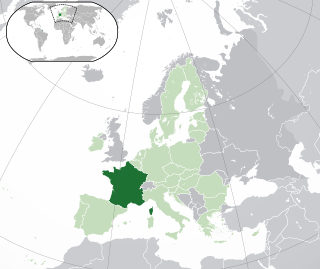Clitoridectomy or clitorectomy is the surgical removal, reduction, or partial removal of the clitoris. It is rarely used as a therapeutic medical procedure, such as when cancer has developed in or spread to the clitoris. It is often performed on intersex newborns. Commonly, non-medical removal of the clitoris is performed during female genital mutilation.

The Organisation Intersex International (OII) is a global advocacy and support group for people with intersex traits. According to Milton Diamond, it is the world's largest organization of intersex persons. A decentralised network, OII was founded in 2003 by Curtis Hinkle and Sarita Vincent Guillot. Upon Hinkle's retirement, American intersex activist Hida Viloria served as Chairperson/President elect from April 2011 through November 2017, when they resigned in order to focus on OII's American affiliate, OII-USA's transition into the independent American non-profit, the Intersex Campaign for Equality.
Rebecca M. Jordan-Young, is an American feminist scientist and gender studies scholar. Her research focuses on social medical science, sex, gender, sexuality, and epidemiology. She is an Associate Professor of Women’s, Gender, and Sexuality Studies at Barnard College.

Fixing Sex: Intersex, Medical Authority, and Lived Experience, a book by Stanford anthropologist and bioethicist Katrina Karkazis, was published in 2008. Described as "thoughtful", "meticulous", and an "authoritative treatise on intersex", the book examines the perspectives of intersex people, their families, and clinicians to offer compassionate look at the treatment of people born with atypical sex characteristics.
Georgiann Davis is an associate professor of sociology at the University of New Mexico and author of the book Contesting Intersex: The Dubious Diagnosis. Davis formerly held similar positions at University of Nevada, Las Vegas and Southern Illinois University Edwardsville. Born with Androgen Insensitivity Syndrome, she writes widely on intersex issues and the sociology of diagnosis.

Morgan Carpenter is a bioethicist, intersex activist and researcher. In 2013, he created an intersex flag, and became president of Intersex Human Rights Australia. He is now executive director. Following enactment of legislative protections for people with innate variations of sex characteristics in the Australian Capital Territory, Carpenter is a member of the Variations in Sex Characteristics Restricted Medical Treatment Assessment Board.

Katrina Alicia Karkazis is an American anthropologist and bioethicist. She is a professor of Sexuality, Women's and Gender Studies at Amherst College. She was previously the Carol Zicklin Endowed Chair in the Honors Academy at Brooklyn College, City University of New York and a senior research fellow with the Global Health Justice Partnership at Yale University. She has written widely on testosterone, intersex issues, sex verification in sports, treatment practices, policy and lived experiences, and the interface between medicine and society. In 2016, she was jointly awarded a Guggenheim Fellowship with Rebecca Jordan-Young.

Intersex, in humans and other animals, describes variations in sex characteristics including chromosomes, gonads, sex hormones, or genitals that, according to the UN Office of the High Commissioner for Human Rights, "do not fit typical binary notions of male or female bodies".
Iain Morland is a British music technologist and author. He formerly lectured in cultural criticism at Cardiff University. His writings focus on issues of gender and sexuality, medical ethics, and science. In 2005, Times Higher Education described Morland as a leading academic in the field of sex research. He has edited an edition of the journal GLQ, and co-authored Fuckology, a critical analysis of the writings and practices of John Money. With Lih-Mei Liao, Morland co-founded in 2002 Critical Sexology, a continuing interdisciplinary seminar series on gender and sexuality. His audio work includes audio editing, sound design and programming.

Intersex people are born with sex characteristics, such as chromosomes, gonads, or genitals, that, according to the UN Office of the High Commissioner for Human Rights, "do not fit typical binary notions of male or female bodies."
The Phall-O-meter is a satirical measure that critiques medical standards for normal male and female phalluses. The tool was developed by Kiira Triea based on a concept by Suzanne Kessler and is used to demonstrate concerns with the medical treatment of intersex bodies.

Cary Gabriel Costello is an intersex trans male professor and advocate for transgender and intersex rights. His areas of study include identity, sexuality, privilege, and marginalization.

Intersex people are born with sex characteristics, such as chromosomes, gonads, or genitals that, according to the UN Office of the High Commissioner for Human Rights, "do not fit typical binary notions of male or female bodies". "Because their bodies are seen as different, intersex children and adults are often stigmatized and subjected to multiple human rights violations".

Intersex people are born with sex characteristics that "do not fit the typical definitions for male or female bodies". They are substantially more likely to identify as lesbian, gay, bisexual, or transgender (LGBT) than endosex people, an estimated 52% identifying as non-heterosexual and 8.5% to 20% experiencing gender dysphoria. Although many intersex people are heterosexual and cisgender, this overlap and "shared experiences of harm arising from dominant societal sex and gender norms" has led to intersex people often being included under the LGBT umbrella, with the acronym sometimes expanded to LGBTI. Some intersex activists and organisations have criticised this inclusion as distracting from intersex-specific issues such as involuntary medical interventions.

Intersex rights in Australia are protections and rights afforded to intersex people through statutes, regulations, and international human rights treaties, including through the Sex Discrimination Act 1984 (Cth) which makes it unlawful to discriminate against a person based upon that person's intersex status in contexts such as work, education, provision of services, and accommodation.

Intersex people in the United States have some of the same rights as other people, but with significant gaps, particularly in protection from non-consensual cosmetic medical interventions and violence, and protection from discrimination. Actions by intersex civil society organizations aim to eliminate harmful practices, promote social acceptance, and equality. In recent years, intersex activists have also secured some forms of legal recognition. Since April 11, 2022 US Passports give the sex/gender options of male, female and X by self determination.
Suzanne Kessler is an American social psychologist known for the application of ethnomethodology to gender. She and Wendy McKenna pioneered this application of ethnomethodology to the study of gender and sex with their groundbreaking work, Gender an Ethnomethodological Approach. Twenty years later, Kessler extended this work in a second book, Lessons from the Intersexed.

Intersex people in France face significant gaps in protection from non-consensual medical interventions and protection from discrimination. The birth of Abel Barbin, a nineteenth-century intersex woman, is marked in Intersex Day of Remembrance. Barbin may have been the first intersex person to write a memoir, later published by Michel Foucault.

Intersex people are born with natural variations in physical and sex characteristics including those of the chromosomes, gonads, sex hormones, or genitals that, according to the UN Office of the High Commissioner for Human Rights, "do not fit the typical definitions for male or female bodies". Such variations may involve genital ambiguity, and combinations of chromosomal genotype and sexual phenotype other than XY-male and XX-female. Preimplantation genetic diagnosis allows the elimination of embryos and fetuses with intersex traits and thus has an impact on discrimination against intersex people.









